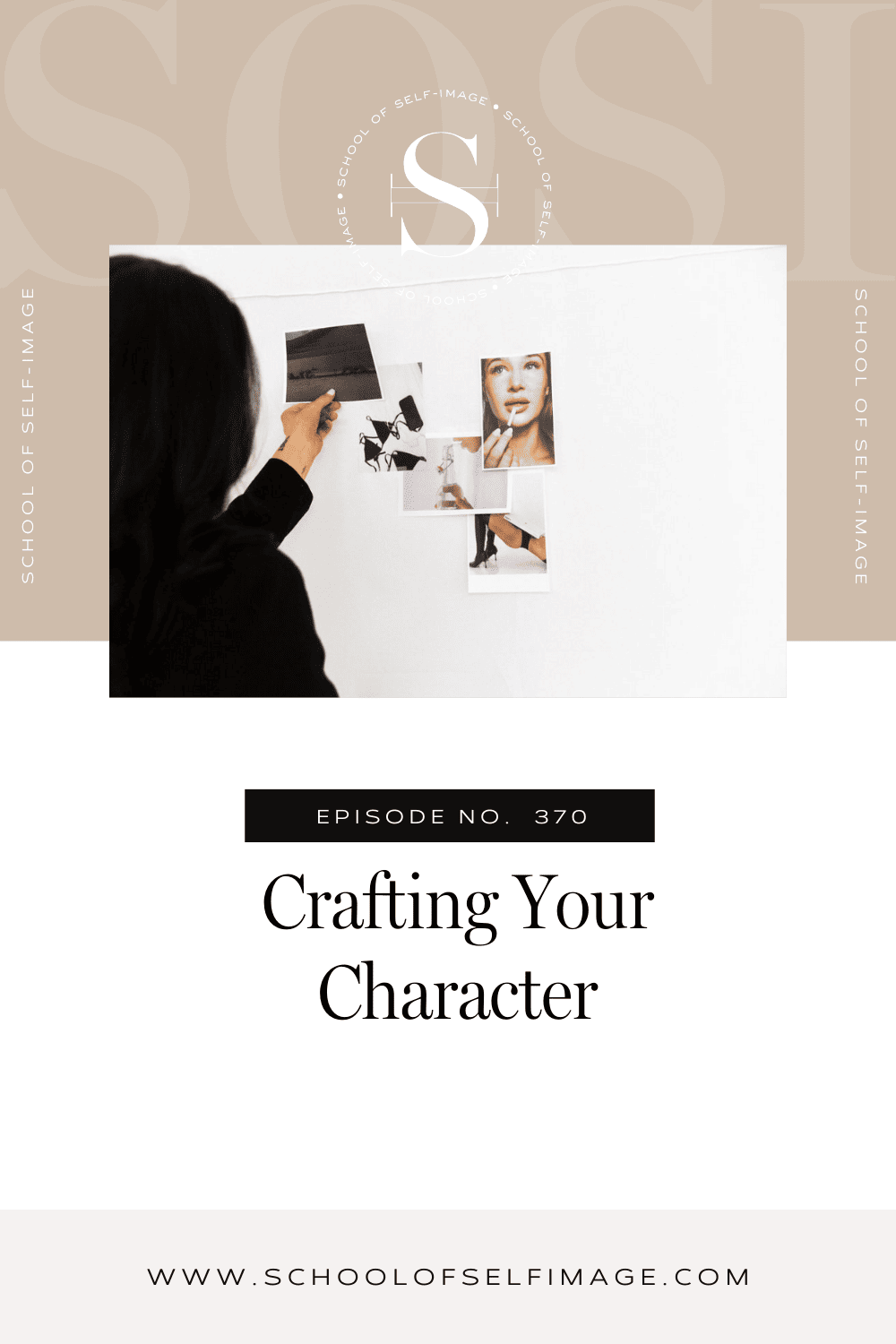It is a brand new year, my friend, and I want to start this year off by asking you a question. What character are you tired of playing, and which character are you ready to step into? Because that is what we are kicking off this new year thinking about. So without further ado, let's dive into the first episode of 2024.
Welcome to the School of Self-Image, where personal development meets style. Here's your hostess, master life coach Tonya Leigh.
Happy 2024, my friends. We did it. We made it through another year. And some of us may have some scars, and some bruises, and some aches and pains because we fell down a lot last year. But you know what? We picked ourselves up, and here we are standing in a brand new year. And I am excited for this community. I am so looking forward to seeing what we create this year.
Now, I want you to pay attention to the word that I just used. I used the word create. I didn't use the word fix. What are we going to improve? What are we going to change? I talked about creation, because creation's a very powerful word.
I want you to think about the difference in saying to yourself, "I need to fix myself," or, "I want to create myself." This is a big distinguishing factor in how different people approach growing and developing themselves personally.
And it's exactly why I created the Live Like an Editor workshop, which is happening next week. It is all about seeing your life and yourself as this beautiful masterpiece, and you deciding what this year is going to be about. And more specifically, how you want to create yourself this year.
It's such a better way to start the year than sitting around and having the same old New Year's resolutions of, "I'm going to pay off my debt, I'm going to lose weight, I'm going to be more organized." Now listen, all of those things are beautiful, but how we think about those things and how we approach them will determine whether we're successful or not.
So the Live Like an Editor workshop is all about you taking a met of view at your year and thinking of your life as a magazine, and deciding what your magazine is going to be about this year.
And during this workshop, we talk about your intentions for the year. We talk about the environments that you want to curate, to help you embody these intentions. We talk about how you show up in your style to help you embody these intentions, how you speak. It is the ultimate workshop in learning how to create yourself and your life on purpose, and it's so much fun.
One of the things that the women did the first year I ran this workshop was brilliant. It was their idea, not mine. But since then, we've all been doing it ever since they debuted this little edition.
But we create magazine covers for this workshop, and I lead you through how to do this. And year after year, I print mine off, and I have it close by so that I can remind myself throughout the year, "This is what you declared, this is what you claimed at the beginning of the year."
And so many women tell me that this workshop has set them up for their best years. And it's only $37. Five days we get to spend together, and it's all recorded. So even if you can't be there live for our daily live calls, you can watch the replays. You get a morning audio lesson so you can listen to it in the car while you're on your way to work or you're walking the dogs.
And I think one of the best features of this workshop is that we have a pop-up group, where everyone is talking about all that they're learning and discovering. And during our five days together, women are sharing their magazine covers. We're talking about the concepts. It is so much fun.
Because listen, I'm not going to sit here and say that personal development is easy, because change is uncomfortable. It can be difficult, because you're facing a lot of things that are challenging, that are scary.
But when you approach it with a more fun, creative lens, it takes a little bit of the seriousness out of it. And when you're doing it alongside other women who are also confronting similar things that maybe you're confronting, it just adds a level of comradery, and community, and fun to this whole process.
So if you would like to play around with and experiment with a completely new way, a fresh way of looking at your year, come and join us. We're going to have so much fun. And again, it starts next week. You can go to schoolofselfimage.com/workshop, and I hope to see you inside.
For today's episode, I have thought long and hard over the last month what I wanted the first episode of the year to be about. And I had several ideas that I was playing around with, and they were all good, but there was one in particular that really stood out to me, and it goes along beautifully with the Live Like an Editor workshop. And so I want to talk today about the concept of crafting your character.
This is one of my favorite topics to talk about, and to study, and to sit around and just think about. And I get a lot of pushback from people on this. So many people when I've talked to them about this concept of you can change who you are, they want to tell me, "No. There's just an internal blueprint that you can't change."
And I think that's just a really limited way of looking at ourselves as creative beings. And I don't like thinking that we can't change, because if that is true, then it means you are a fixed being, and your potential is limited. And I will never believe that about any of us.
And when I look back at my own life, and I look at the characters that I used to play, and I played them well. I played them so much, I just thought that's who I was. Someone had handed me a script as a child and they're like, "This is who you're supposed to be." And I played that character day, after day, after day, and then one day I realized that that character was holding me back.
When I think about the character that I played for years of the overwhelmed mother, the anxious business owner, the overworked and burnt out nurse, these were characters that I was so used to playing. I didn't know that I could choose anything other than those things.
Until I learned about coaching, and I learned about neuroplasticity, and how we can change our neural pathways, and program our bodies to actually feel different emotions. When I learned to manage my mind and I learned about how to have a growth mindset versus a fixed mindset, I started to understand, "Oh wait. We really can change the characters that we are playing in our lives."
We are not fixed human beings, but we can have fixed mindsets. The mindset that says, "This is just who you are, don't put yourself out there. If you're not good at it, don't do it." Which keeps us so small and limited. It keeps us from experiencing the realm of possibilities that are available to us, if we are willing to change who we are being, if we're willing to change our character.
Last year, I found myself playing a character that I've been really good at playing. And in some ways, it has served me, because that's the thing. If it didn't serve us, we wouldn't play it. And sometimes, the way it serves us is that we don't have to have conflict. We don't have to confront things. We can live in our cozy little world, but deep inside it just eats at us.
So I'm going to be really vulnerable here, and I'm going to share a character that I've been playing for a while that I didn't even realize how much I was playing her until I started to confront the uneasiness, the frustration, the worry, the anxiety that this character was causing me.
And I'm sharing this for a couple of reasons. Number one, there is a tendency for people to be put on pedestals, and I don't ever want to be put on a pedestal, ever. Because if you're on a pedestal, eventually you're going to fall. And I just rather not even be put up there. I don't put myself up on a pedestal. I don't want you to put me on one either. Can you learn from me? I hope so. Can I support you? I hope so.
But we can forget that people are so human. And I don't care how much success you have, how much money you have. Every single one of us have challenges and we have struggles. And I'm very open with members within the School of Self-Image about what mine are so that I can use them to teach. I can use them as examples, and hopefully use them to make us all stronger.
The other reason why I'm sharing this with you is that this particular thing, this character that I've been playing, a lot of y'all have been playing it. And so the character is the character of the abdicator.
So let's look at what this word means, to abdicate. It is when someone in power decides to give up their power and step down from his or her position. So they abdicate their authority, giving up duties and the perks of the job.
This year, or let's say last year, I realized all of the ways that I was abdicating my own power when I was just letting people speak to me in ways that were not acceptable, when I was being passive, when I was ignoring and turning a blind eye, so I didn't have to deal with it, let other people deal with it.
And what I realized is that character did serve me, because I was able to avoid conflict. Are any of you like that, you don't like conflict?
And that makes sense if you grew up with a lot of conflict, and you created safety for yourself by hiding from the conflict and protecting yourself. But the downside of that is that as adults, we often ignore our guts. We often don't speak up, and we let other people take charge.
And last year was a big awakening, and I've done a lot of work on this. I feel like I have stepped in my power in so many ways, but there were a couple of things specifically that I looked at and I was like, "I've been playing the character of abdicator," and I'm like, "She is not serving me any longer." The cost of playing this character was way more than me choosing to create a new one. It started to cost me, and it cost me through disappointment in myself. It had nothing to do with anybody else. I can blame other people, but that's me abdicating power again. It caused me to have to really look at myself. And I was disappointed in myself actually. And that was when I started to get my power back.
And so I'm going to be talking more about this in the Live Like an Editor workshop. Actually for members, we're going to be doing next week after the live sessions for the Live Like an Editor calls that we're going to be doing each day, I'm going to be doing member only calls, and I'm going to be talking about one specific situation in my business, and how I've used my word of the year, which I'm also going to be revealing next week, to really help me get out of this pattern.
And so that's going to be really great. If you're a member, you're going to want to attend that or at least watch the replay. I think it's going to be so powerful to just hear about the story, and my business, and how I started to get my power back. But nevertheless, for this episode, that character was not serving me. And thank goodness we can change our characters.
I was reading about actors and their process of literally practicing new characters. And they practice it so much, that many of them find it hard to get out of character because they've been in that character for so long. They've been thinking like the character, feeling like the character, dressing like the character, embodying the energy of this character, that they start to become the character, even when the cameras aren't rolling, even when they've stepped off the stage. And that shows you the power of being able to create your character.
I'm suggesting that we do this in our everyday lives. Look at the characters that we've been playing that just don't serve us. Have you been the passive friend? Have you been the burnt out CEO? Have you been playing the character of the jealous girlfriend maybe, or the overwhelmed mom, or the worried grandmother?
What are the characters that you've been playing that you're like, "You know what? I am just done with this. It's not making my life any better. It's not helping me reach my goals, and it's just no longer fun. It's not even helpful at this point."
Now the thing is, when you start to create new characters, you're going to have to face a lot of discomfort. Again, I go to actors. When they're practicing these new characters, it's strange and awkward. They forget their lines, they come out of character. And the directors can tell you're out of character, and they have to get back into character. There's a lot of failing along the way to embody these new characters. But with consistency and with practice, eventually it's just who they become.
So let's talk about what creates a person's character. The first thing is a person's character is created by their values. What principles matter most to you? And do you make your decisions guided by them?
Think about it this way. If your character values comfort, you're going to make very different decisions than the person who values adventure. And this requires that we go within and ask, do we like the values that we're living by right now? And if you do like your values, are you fully living by them? Because sometimes, we have these values, but we're out of integrity with them, and that affects our character.
The other thing that defines a person's character is their behavioral consistency. What are the things that are doing day in and day out? What are your habits? Your habits are not only a reflection of your character, but they also reconfirm your character.
Your characters also determined by your reactions. How do you respond to the world around you? How do you handle stress or hardship? For the person who is compassionate, their response is going to be very different than the character who is not trustworthy. For the person who is frazzled, their response is going to be very different than the person who is calm. If you are confident, you're going to respond very differently to challenges versus someone who has a lot of insecurity. So our reactions are a result of our character.
And so if you want to change your character, you're going to need to really look at how you react. And when you think about this new character that you want to play this year, that you want to embody, you're going to have to start practicing reacting to the world in the way that he or she would.
And it's going to be uncomfortable. It's going to feel... Just like the actor who's practicing a new character, you're going to fail. You're going to have that moment where something happens outside of you, and you're going to react in an old way. But every time you do that, it's a chance to learn, like, "What happened? Why did I step out of character? What was I thinking?" And it's a chance to just practice again and again.
Your character also determines your relationships. The way you treat other people, including your ability to empathize, show compassion, and maintain healthy relationships. That's a key aspect of character. It's not just about how you act, it's also about how you interact and connect with others.
And so when you think about the character that you want to craft, how is she or he in relationships? Is there a sense of empathy? Is there a sense of honesty, and understanding, and compassion? And again, if you have been used to maybe not trusting other people, or getting easily triggered or angry, it's going to take some time and some grace with yourself to practice this new character.
But we need to look at our relationships, because that will show us the characters that we have been playing. And if you're not happy in your relationships, maybe it's time to craft a new character.
Another aspect that greatly impacts character, this might be the biggest one, is your character's belief systems. What is the pattern of thought in your character? Because again, someone who is playing the character of confident, let's just say confident CEO, is going to be very different than the character of overwhelmed CEO, two very different characters. Even though the role is the same, how that character's going to come across, let's just say on stage, how they're going to dress, how they're going to speak to others, totally different.
So what's the difference in the two? And it's going to boil down to how they think, how they think about themselves and how they think about the world. And so you're going to have to look at... And this is something that we do in the self-image method and the membership, but we do case studies of your after, the character you're becoming. And how does she think, how does she feel? How does she show up? How does she interact with other people? But it all starts with thinking, because that directs everything else.
And so when I was thinking about the character that I've been playing this year, or last year let's say, because we are now officially in a new year. But the thoughts that I had in my head, I can now see why I was playing an abdicator so well. I was having thoughts like, "Let's just keep the peace. Let's just keep everybody happy. I don't want to hurt people's feelings." Typical people pleasing. Y'all are about to see Tonya Leigh break that cycle. This was the year that it ended.
And listen, it's hard as a people pleaser because I will always care what people think. I will always be very considerate, because I want to serve at a high level, and I think you have to care what people think. But this is a different one. This is when you are chipping away at your own soul to please others. Y'all know the difference. There's a difference in wanting to please because it feels good and it feels aligned, versus wanting to please just so other people won't be mad at you, even though it requires you to be someone you don't want to be any longer.
But if your character's thoughts are just keep the peace, don't hurt anyone's feelings, don't rock the boat, this is going to be too hard. You can see how you can easily fall into a role of abdicator, versus the person who's in their power. Their thoughts are so different. They are thinking thoughts like, "I am going to do what is aligned with me. Even if it's hard, I'm willing to have the hard conversations. I'm going to speak up when things aren't right. I'm going to speak up when boundaries are being crossed. I'm going to speak up when I feel like someone is out of integrity. I'm going to speak up when there is something that needs to happen, and I'm going to be willing to have the hard conversations and make the hard decisions so that those things happen." Two very different belief systems going on here. And so when you start crafting a new character, you're going to have to look at what belief systems am I going to have to change to embody this new character? So those are some of the internal things that craft your character.
But I also want to talk about some external factors that support your character, that when you start to change your character, you're going to need to change these things too, or it's going to be so much harder.
So the first external factor that impacts your character and also expresses your character is your character's style. Y'all knew I was going to talk about this. It is a common theme in self-image work. But it's so important, because your style tells a story. It tells a story about who you are.
I can't remember who said it, but I think it may have been... Oh my gosh, what's her name? The famous, Rachel Zoe, that's her name who said, "Style is saying who you are without having to speak." And it's so true. Last year, I taught a powerful five-month program called The Style Experience. And one of the exercises that we did was called characters in your closet. And I just had the women look at the clothes in their closet and what characters those clothes represented, who they had been playing. And a lot of them had so many epiphanies. They're like, "I've been playing the tired mom. I've been playing the executive even though I'm no longer an executive." But her whole closet was full of corporate clothing and she was ready to play new characters with her clothing.
Next time you all watch a movie or a show, I want you to pay attention to this. In fact, turn off the sound and just watch the people on the screen. And what can you gather about their character? Their personality, maybe a belief system, just by watching their style. How they dress, how they carry themselves, how they communicate, just non-verbally. You will learn so much about this topic.
I'm watching this show right now that's so mesmerizing for this alone. And the show is about this drug dealer who is trying to get out of the drug world and establish himself as a prominent New York businessman, well-respected. But he's straddling these two worlds, and I just watch how he dresses in each of these worlds. When he is playing one character, which he actually has a different name, his drug world name is different from his New York businessman name.
So really, he's playing two different characters, and they dress very differently. I know when he's about to go out and kill somebody just based on how he's dressed. I'm like, "He's playing Ghost right now. He's not playing James St. Patrick. He's playing a totally different character." And it's so fascinating.
Even for me last year, I decided I wanted to play the character of an energized woman. That was my word of the year, energized. And so last year, I wore more workout clothes than I usually do, because I wanted to be ready to go. The moment I would put on yoga pants and my cute little top, my brain was like, "I guess we're going to go move our body today."
Not that you can't do things in a skirt or a dress, it's way harder. Trying to work out in a dress, your brain's confused. They're like, "What are we doing? Why are we doing pushups and address? This seems out of alignment." And it comes down to a term called enclothed cognition, which basically states that what you encloth yourself in is sending signals to your brain about who you are.
If you think about a doctor, when someone walks into your room, and unfortunately, and this has got to change, but if a man walks in with a lab coat on, we automatically think, "He must be a doctor." I remember when I worked as a nurse, I would walk in and sometimes I'd have a lab coat on, and they would just assume I was a nurse. They never assumed I was a doctor. And that's got to change. That's a topic for a whole different conversation. But if you are a female doctor, I get you. I know some of your struggles because I saw it firsthand. However, I digress. Back to the topic.
But when you see someone in a lab coat, you have thoughts about them. And the moment they put on that lab coat, they have thoughts about themselves, their character. And so how you dress, how you carry yourself is signaling to your brain the character that you are choosing to play.
I was talking about this with my man, and he was sharing with me how it was always sort of jarring when he would see his teacher outside of the classroom, he would run into her at the grocery store. And just based on how she was dressed, he was like, "Wait, I think that's my teacher." But she was playing a different character outside of the classroom. And that is the power of clothing. That is the power of style. We can embody new characters based on how we are dressing.
The last one that I want to share with you is one that if you are in the membership, you know all too well because we talk about it a lot. But the external factor that you need to pay attention to when you're crafting your new character is your environment. The places that you place yourself in, what you surround yourself with, who you surround yourself with. What you are looking at every day is confirming a character to you.
So if you want to craft a new character, you're going to need to start placing yourself in places where he or she are hanging out. You need to be talking to people that he or she would be talking to. You need to be placing things around yourself that reflects back to you who you are being. Let me give you an example.
I want to play the character of a calm and confident business owner. And I've been playing this character for a while now. Do I have moments of doubt? Yes. And you all in the membership are going to hear about how I abdicated power in my business next week if you come to that call. But for the most part, I have practiced being calm and being confident in my business.
And so when I think about her environment, it is clutter-free. I love to have candles burning around me. I love to have beautiful music playing, because that environment confirms the character that I'm playing.
Now, if I just woke up and wasn't intentional, I might forget to put on the music. I might not light the candle. I rush into doing things and being overwhelmed. And then my desk, I don't take time to put things away. And so clutter starts to pile up on my desk, and all of a sudden, I start to confirm a different character that I don't want to play. And so pay attention to your environments.
This is going to be a lot of the work that we do in Live Like an Editor. We're going to be looking at our environments, and does it support the character that we want to play this year? And if not, what needs to change? What new environments do you need to curate? What environments do you need to get out of to support you in this new character that you are crafting for this year? So I want you to think about this question. What character do you want to play in 2024?
And I love the word play, because this is all just an experiment my friends. Life is just an experiment. And I think the more that we can step into it with a playful attitude, not taking ourselves too seriously, and we're willing to fail and get it wrong and learn and grow, the more fun it is and the more we just fall in love with the practice, the more we just fall in love with the journey.
I shared a quote in the membership last week that said, and I don't know who to attribute it to, because I read it somewhere and I didn't see who said this, but it's so good. And it said, "The person who loves to walk will go much further than the person who just loves the destination."
And I want to leave you with that. Crafting our characters is just falling in love with the process of self-discovery, self-awareness, and practicing new ways of being in the world, noticing what serves you and what doesn't. And I'm always on the journey. I'm always trying new things. I'm always playing around with new characters. I'm always letting go of the old ones that no longer serve me.
And so if you feel like you've been playing a character that's holding you back, I want you to know you can change it. You get to craft a new character my friends. Happy 2024.
And again, I hope to see you in the workshop. If you would love to take this work deeper, let's do it. It starts next week on January the 8th. You can go to schoolofselfimage.com/workshop. Get signed up, and let's get to work on crafting your character for 2024. Have a beautiful week, and I'll see you in next week's episode. Cheers.
Hey, have you grabbed your free copy of the School of Self-Image Manifesto? If not, what in the world? Head over to schoolofselfimage.com/manifesto, and get a copy that teaches you how to think and show up in the areas of mindset, style, and surroundings, so that you can transform your self-image.














